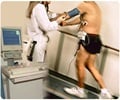Engineers from the Kansas State University are designing new tools and biomedical sensors for spacesuits in an attempt to keep astronauts healthy in space.

The project involves five parts, with several students involved in each part, and while the first phase is developing and testing biosensors that can monitor astronauts' vital data, such as breathing rate or muscle activity, the second phase is creating a specialized wireless network so that spacesuit biosensors can communicate with each other and with a space station.
Using energy harvesting technology to power radios and biosensors while an astronaut is in a spacesuit is the third part and fourth part is building hardware prototypes for biosensors and energy harvesting electronics.
Producing spinoff technologies, such as new radio technologies and devices that apply to home care is the last part.
The engineers are using 3D electromagnetic field simulators and a spacesuit model built by Erin Monfort-Nelson, student in apparel, textiles and interior design.
The suit replica is made of multiple layers of material, including metalized fabrics to model the layers in real suits that protect astronauts and keep them warm.
These methods use the temperature difference between body heat and the spacesuit's cooling garment to power radios and other electronics inside the spacesuit.
Some of these wearable body area network sensors include electromyographic sensors to monitor muscle activity, accelerometers to measure movement, pulse oximetry sensors worn on the forehead, wrist or finger to measure blood oxygen saturation and heart rate, and chest-worn respiration belts to measure breathing rate.
Source-ANI
 MEDINDIA
MEDINDIA




 Email
Email






